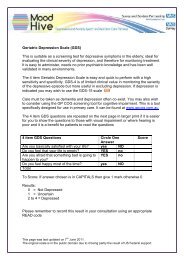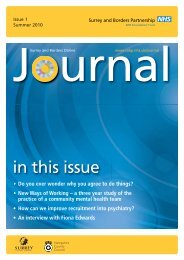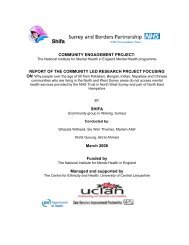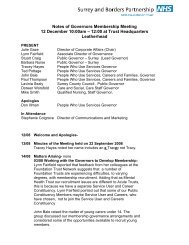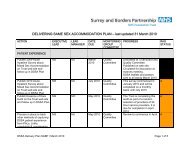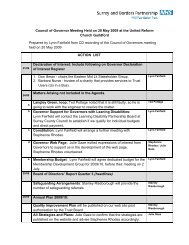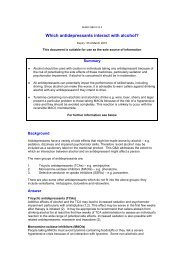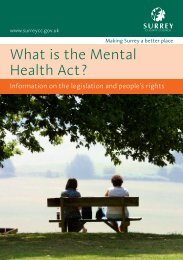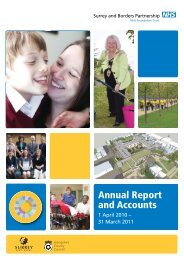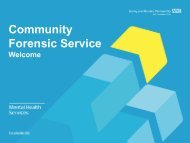Medicines Q&As
Medicines Q&As
Medicines Q&As
You also want an ePaper? Increase the reach of your titles
YUMPU automatically turns print PDFs into web optimized ePapers that Google loves.
<strong>Medicines</strong> Q&<strong>As</strong><br />
In addition, some antidepressants may interact with anticonvulsants; this potential for interactions<br />
would need to be considered when choosing a suitable antidepressant agent for the patient. Plasma<br />
concentrations of the anticonvulsants should be carefully monitored if appropriate, particularly during<br />
the early phase of treatment with the antidepressant and doses adjusted accordingly (6;11;22).<br />
<strong>As</strong> a general rule, the more sedating a drug is, the more likely it is to induce seizures (22). There is a<br />
dose dependent relationship between antidepressant use and seizures. Patients should be<br />
commenced on a low dose, and this should be increased slowly until a therapeutic dose has been<br />
achieved, to reduce the risk of seizures (7;22). In addition, maximum recommended doses of<br />
antidepressants should not be exceeded.<br />
Summary<br />
• The first consideration should always be to check the patients’ anticonvulsant regimen for<br />
potential drug-induced depression. It may be that the patient would benefit from changing the<br />
anti-convulsant to another agent with a more favourable effect on mood rather than adding in<br />
an antidepressant.<br />
• The risk of seizures with most antidepressants is low, but is probably not zero for any of them,<br />
and patients should be made aware of this when prescribing. The risk of seizures increases<br />
with increasing doses.<br />
• SSRIs are considered the first line antidepressant option in patients with epilepsy. Published<br />
data do not support the recommendation of a specific SSRI, although fluoxetine is not the<br />
best choice due to its long half-life, a possibly greater incidence of seizures and an increased<br />
risk of drug interactions. Citalopram or sertraline may be considered the better option due to<br />
safety and reduced interaction potential with the anticonvulsants.<br />
• Moclobemide, is a good alternative, as it has a low incidence of seizures but due to limited<br />
data it should be reserved as a second choice.<br />
• TC<strong>As</strong> should be used cautiously in patients with epilepsy and reserved for patients who<br />
poorly respond to or are intolerant of other antidepressants. Where a TCA is needed, doxepin<br />
would be the agent of choice.<br />
• Clinicians should be aware of the possibility of interactions between antidepressants and<br />
anticonvulsants and should monitor carefully patients with epilepsy who are prescribed<br />
antidepressants.<br />
• Introducing the antidepressant gradually, starting with a low dose, and not exceeding the<br />
maximum recommended doses may reduce the risk of a seizure.<br />
Limitations<br />
In general, very little specific information is available about the use of antidepressants in epilepsy.<br />
Most studies investigating the relationship between antidepressants and seizure activity have<br />
examined the effects of antidepressants in overdose in the general population, making it difficult to<br />
extrapolate the findings to patients with epilepsy. Seizure rates quoted are based on the incidence in<br />
patients with depression rather than patients with epilepsy, and this latter figure would be expected to<br />
be higher. Many of the early estimates of seizure incidence were based on case reports where there<br />
were many influencing variables and poor definitions for what constituted a convulsive event.<br />
Patients were also often taking concomitant medication, which may have affected seizure threshold,<br />
or, through inhibition of antidepressant metabolism, caused higher antidepressant plasma levels.<br />
Newer antidepressants have undergone clinical trials with improved methodology and with systematic<br />
reporting of adverse events. However, even these do not allow accurate comparisons to be made<br />
between the antidepressants. There are few systematic studies of antidepressants in people with<br />
epilepsy. Unless a large-scale trial is conducted, which is unlikely, the best antidepressant in epilepsy<br />
will remain unknown (7).<br />
From the National Electronic Library for <strong>Medicines</strong>. www.nelm.nhs.uk 4



